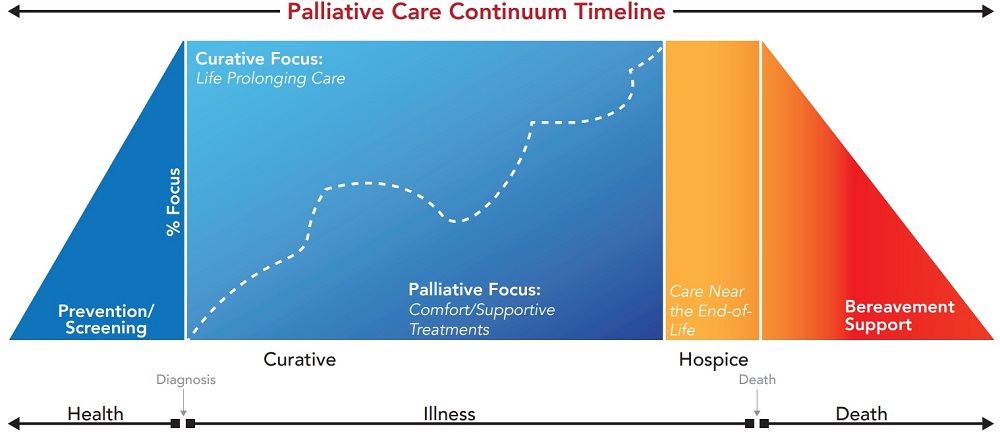About Palliative Care

Learn more about Palliative Care
Palliative Care- An Extra Layer of Support. Palliative (pronounced pal-lee-uh-tiv) care is specialized healthcare for people with serious illness. Palliative Care:
- focuses on providing patients with relief from the symptoms, pain, and stress of a serious illness—whatever the diagnosis or prognosis.
- is provided by healthcare professionals who work together with patients and families to provide an ‘extra layer of support’.
- is appropriate at any age and at any stage in a serious illness.
- is provided along with curative treatment or can be focused on comfort measures only.
It’s about Comfort, Communication, Choices and Control:
- Comfort: Easing pain, suffering and other symptoms.
- Communication: Providing expert information with everyone involved.
- Choices: Offering options as well as alternatives for patients and families.
- Control: Honoring and respecting the Patient (and Family) informed decisions.
Q: Isn’t palliative care the same as hospice care?
A: No. All of hospice care is palliative care, but not all of palliative care is hospice. Hospice focuses on comfort and specific end of life care whereas palliative care is available and offered to those patients and families facing serious illness. Palliative care can be offered months to years before someone is appropriate for hospice care.
Q: Can I have palliative care when I still want everything possible for me to get better?
A: Yes. Anyone who has a serious illness can benefit from palliative care. You can get care and treatment for your illness as well as receiving palliative care at the same time. You do not have to choose over the other.
Q: Why would I want palliative care?
A. Most doctors and nurses focus mostly on you as a patient with a disease. However, palliative care will focus on you as a person, your family and be a strong advocate to get all of your questions answered. The palliative care team members want to know more about what is important to you and what you and your loved one’s concerns are. Palliative care sees how your illness affects not just you but your family and loved ones.
Q: Is palliative care available where I live?
A. Not all regions or hospitals have palliative care. Nancy will assist you and your healthcare providers to bring palliative care to you the best way we can. She will find what services and providers are available for you. She is an expert in palliative care information and education and will assist you to the best of her ability.
What Is Palliative Care?
Palliative care is specialized medical care for people with serious illnesses. It is appropriate at any age at any stage in a serious illness and can be provided together with curative treatment. Palliative care promotes quality of life by addressing the physical, psychological, emotional, cultural, social, and spiritual needs of patients and families. It offers treatment of pain and other symptoms; relief from worry and distress of illnesses; close communication about goals of care; and well-coordinated care during illness transition. It also provides care across treatment settings and support for family/caregivers and offers a sense of safety in the healthcare system. Palliative care is delivered by a team of physicians, nurses and other specialists who work with the patient’s other doctors to provide an extra layer of support.What Is Hospice Care?
Hospice care is a team approach to expert medical care for individuals who face a life-limiting illness. With a focus on comfort, the team develops a plan of care tailored to each individual’s needs and goals. It includes pain and symptoms management, personal care, emotional and spiritual support, and grief support for the each individual’s loved ones. All of hospice is palliative care, but not all of palliative care is hospice.
For more information:
Nancy Joyner, MS, CNS-BC, APRN, ACHPN®
218-779-5037 • njoyner@nancyjoyner.com
Palliative Care Continuum Diagram modified from:
• Lynn, J. 2005. Living Long in Fragile Health: The New Demographics Shape End of Life Care. Hastings Report. November-December 2005, S14-18.
• American Cancer Society/Cancer Action Network. 2016 North Dakota Palliative Care Presentation. Bismarck, ND.
• Center to Advance Palliative Care. 2018. Diane E. Meier, Director
Palliative Care
Hospice
Useful Resources
- Advance Care Planning- National Healthcare Decisions Day
- Cancer Survivorship – Living With and Beyond Cancer
- Caring Bridge-bringing friends and family together during any form of health journey
- Decision Points in Medical Care (From Sanford Health website/healthwise.org)
- Get Palliative Care (includes a national directory of providers)
- Gone From My Sight ( by Barbara Karnes, the little blue book”)
- Hard Choices for Loving People (by Hank Dunn, chaplain)
- Making Decisions About Cardiopulmonary Resuscitation (CPR) (From Altru website)
- National Comprehensive Cancer Network’s Patient and Caregiver Resources
- Patient Education on Pain (American Academy of Pain Medicine)
- Partners Against Pain
- Patient Center (American Academy of Pain Medicine)
Additional North Dakota Palliative Care Resources
North Dakota Rural Community-Based Palliative Care
North Dakota Palliative Care TeleECHO
Altru Health System, Grand Forks, ND (Serving Northeast ND and Northwest MN)
Sanford Health (Serving Fargo and Bismarck)

